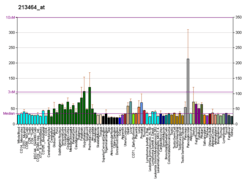SHC2
| SHC2 | |||||||||||||||||||||||||
|---|---|---|---|---|---|---|---|---|---|---|---|---|---|---|---|---|---|---|---|---|---|---|---|---|---|
| Identifiers | |||||||||||||||||||||||||
| Aliases | SHC2, SCK, SHCB, SLI, SHC adaptor protein 2 | ||||||||||||||||||||||||
| External IDs | MGI: 106180 HomoloGene: 19127 GeneCards: SHC2 | ||||||||||||||||||||||||
| |||||||||||||||||||||||||
| |||||||||||||||||||||||||
| |||||||||||||||||||||||||
| |||||||||||||||||||||||||
| Orthologs | |||||||||||||||||||||||||
| Species | Human | Mouse | |||||||||||||||||||||||
| Entrez | |||||||||||||||||||||||||
| Ensembl | |||||||||||||||||||||||||
| UniProt | |||||||||||||||||||||||||
| RefSeq (mRNA) | |||||||||||||||||||||||||
| RefSeq (protein) | |||||||||||||||||||||||||
| Location (UCSC) | Chr 19: 0.42 – 0.46 Mb | Chr 19: 79.62 – 79.64 Mb | |||||||||||||||||||||||
| PubMed search | [3] | [4] | |||||||||||||||||||||||
| Wikidata | |||||||||||||||||||||||||
| |||||||||||||||||||||||||
SHC-transforming protein 2 is a protein that in humans is encoded by the SHC2 gene.[5][6][7]
Interactions
SHC2 has been shown to interact with Kinase insert domain receptor.[8]
References
- 1 2 3 GRCh38: Ensembl release 89: ENSG00000129946 - Ensembl, May 2017
- 1 2 3 GRCm38: Ensembl release 89: ENSMUSG00000020312 - Ensembl, May 2017
- ↑ "Human PubMed Reference:".
- ↑ "Mouse PubMed Reference:".
- ↑ Kavanaugh WM; Williams LT (Jan 1995). "An alternative to SH2 domains for binding tyrosine-phosphorylated proteins". Science. 266 (5192): 1862–5. PMID 7527937. doi:10.1126/science.7527937.
- ↑ Nakamura T; Muraoka S; Sanokawa R; Mori N (Apr 1998). "N-Shc and Sck, two neuronally expressed Shc adapter homologs. Their differential regional expression in the brain and roles in neurotrophin and Src signaling". J Biol Chem. 273 (12): 6960–7. PMID 9507002. doi:10.1074/jbc.273.12.6960.
- ↑ "Entrez Gene: SHC2 SHC (Src homology 2 domain containing) transforming protein 2".
- ↑ Warner, A J; Lopez-Dee J; Knight E L; Feramisco J R; Prigent S A (Apr 2000). "The Shc-related adaptor protein, Sck, forms a complex with the vascular-endothelial-growth-factor receptor KDR in transfected cells". Biochem. J. England. 347 (Pt 2): 501–9. ISSN 0264-6021. PMC 1220983
 . PMID 10749680. doi:10.1042/0264-6021:3470501.
. PMID 10749680. doi:10.1042/0264-6021:3470501.
Further reading
- Choy KW, Wang CC, Ogura A, et al. (2007). "Genomic annotation of 15,809 ESTs identified from pooled early gestation human eyes.". Physiol. Genomics. 25 (1): 9–15. PMID 16368877. doi:10.1152/physiolgenomics.00121.2005.
- Grimwood J, Gordon LA, Olsen A, et al. (2004). "The DNA sequence and biology of human chromosome 19.". Nature. 428 (6982): 529–35. PMID 15057824. doi:10.1038/nature02399.
- Strausberg RL, Feingold EA, Grouse LH, et al. (2003). "Generation and initial analysis of more than 15,000 full-length human and mouse cDNA sequences.". Proc. Natl. Acad. Sci. U.S.A. 99 (26): 16899–903. PMC 139241
 . PMID 12477932. doi:10.1073/pnas.242603899.
. PMID 12477932. doi:10.1073/pnas.242603899. - Liu HY; Meakin SO (2002). "ShcB and ShcC activation by the Trk family of receptor tyrosine kinases.". J. Biol. Chem. 277 (29): 26046–56. PMID 12006576. doi:10.1074/jbc.M111659200.
- Warner AJ, Lopez-Dee J, Knight EL, et al. (2001). "The Shc-related adaptor protein, Sck, forms a complex with the vascular-endothelial-growth-factor receptor KDR in transfected cells.". Biochem. J. 347 (Pt 2): 501–9. PMC 1220983
 . PMID 10749680. doi:10.1042/0264-6021:3470501.
. PMID 10749680. doi:10.1042/0264-6021:3470501. - Pelicci G, Dente L, De Giuseppe A, et al. (1996). "A family of Shc related proteins with conserved PTB, CH1 and SH2 regions.". Oncogene. 13 (3): 633–41. PMID 8760305.
This article is issued from
Wikipedia.
The text is licensed under Creative Commons - Attribution - Sharealike.
Additional terms may apply for the media files.




